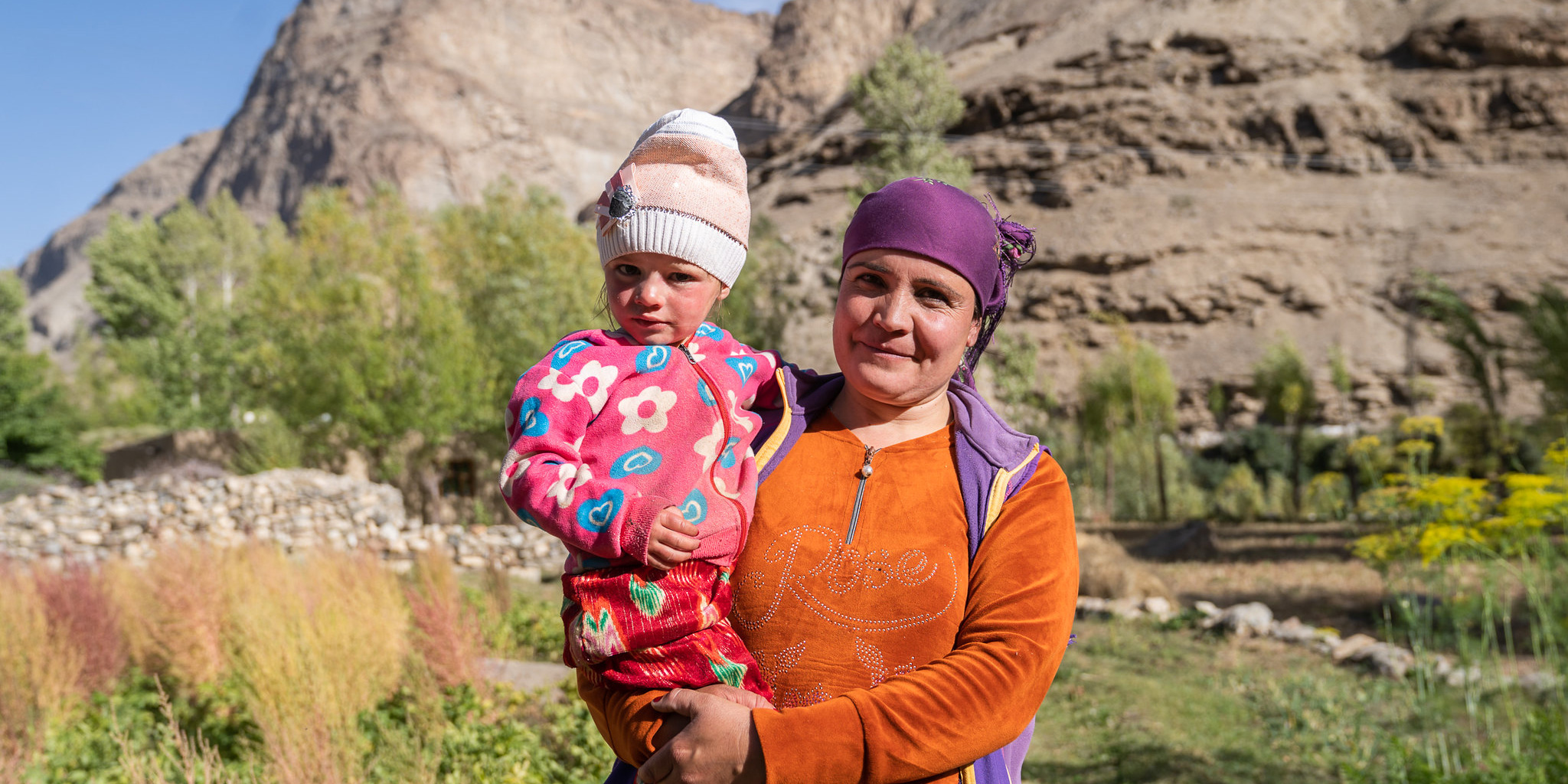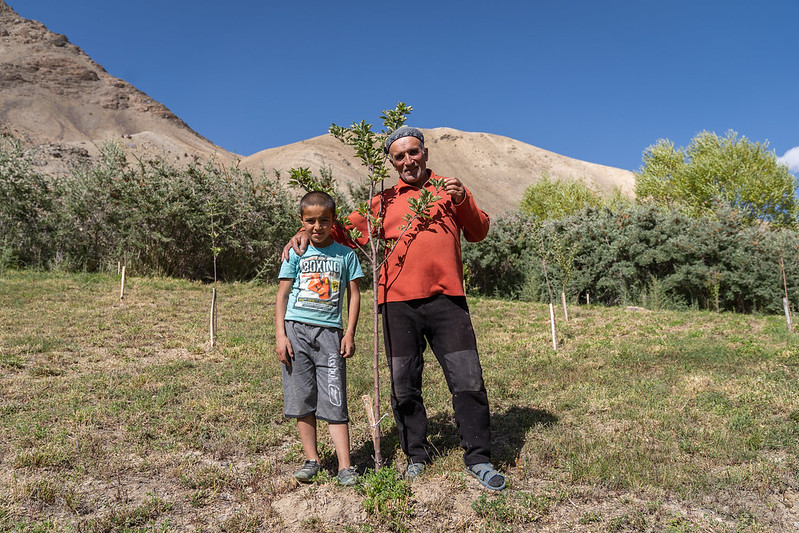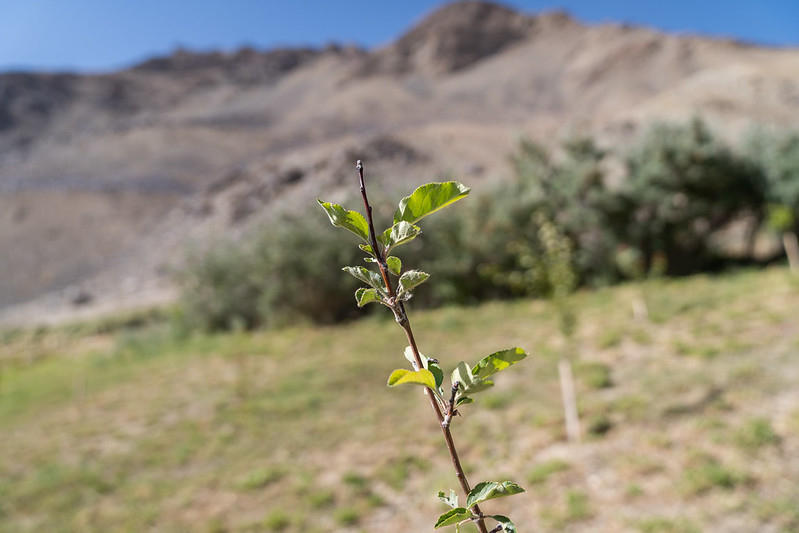A bumper harvest in Tajikistan’s Zarafshon valley: Tabassum’s story

Pokhut is a small village located in Tajikistan’s Zarafshon valley. Many residents are farmers who grow potatoes, fodder and breed cattle for income and subsistence. A lack of arable land has left them with few options to diversify their incomes and develop their farms. Many do not have access to better seeds or fertilisers to get the best from the particular topographical conditions of the region. It is major barrier to breaking the cycle of poverty.
Tabassum Ashurova is a resident of Pokhut village, with two young children. Her husband works as a labourer in Russia. “In rural areas, our options for income are limited,” Tabassum explained. With guidance from the programme team and the support of her husband, she decided to use her small plot of land to create a fruit nursery. The aim was not only to provide a source of food, but also to sell the produce and high-quality saplings to other villagers looking to start their own nurseries.

Apricot trees have been grown in the valley for many years, but the quality of the fruit and the consistency of the harvest varies from year to year. Tabassum described the situation:
“Some years the trees do not bear fruit due to the cold spring, and the fruit trees in our village are generally too old and are of poor quality. When there is no harvest, our family suffers from a lack of income and we are in debt… I have an old apricot orchard nearby which did not harvest for almost ten years.”
As part of a wider programme designed to improve food security and livelihoods through better agricultural practices, the Aga Khan Foundation (AKF) in Tajikistan is implementing the ‘Improving livelihoods and food security through sustainable natural resource management’ programme in close coordination with local authorities and with the financial support of the European Union. The programme operates based on the differing needs and socio-economic conditions of rural communities in the area – in this case Pokhut village has been targeted for developing fruit tree nurseries.

In 2017, programme staff met with Pokhut villagers and helped them form several producer groups that would address the quality of the fruit trees and establish an intensive orchard and nursery. Tabassum joined one of these producer groups – members and their families became shared owners of an orchard with 2,500 apple and 1,100 black plum seedlings. It is through this orchard that Tabassum was able to establish her own nursery on her plot of land and has been able to sell her seedlings to other farmers in the area.
“I am delighted when other farmers see our orchard and decide to buy similar varieties from my nursery”
The new orchard is less prone to spoilage thanks to the programme’s application of “agro-technical rules”, allowing for far greater yields – between 50-60,000kg each year, more than double the usual yield of 20-25,000kg every other year. Through the programme, the producer groups learned many techniques for improving yields, such as removing buds and flowers to help the tree save energy, and how to make compost from raw fertiliser, which results in fewer weeds that would drain vital nutrients from the trees.
With support from the project staff, some of the producer groups also met with scientists from Tajikistan’s Institute of Horticulture and Vegetable Growing who taught the members how to propagate the fruit trees by grafting or using rootstocks (part of the root from which another tree can be grown). The results speak for themselves, and Tabassum is pleased with the progress she has made:
“Now in my nursery I have 300 apple seedlings (3 varieties) 100 apricot samplings (4 varieties), and 2 varieties of black plum seedlings which are ready for sale…I am delighted when other farmers see our orchard and decide to buy similar varieties from my nursery.”
Tabassum is hopeful about her family’s prospects for the future. It is now a real possibility that her husband will not need to go to Russia for work. Between them, with the support and knowledge they have gained from the programme, they can expand the nursery and run the business more efficiently. This year, Tabassum has more than 400 saplings which she will prepare for the following year’s harvest and sell on. Her additional income, and that of the other families in the producer groups, has not only resulted in an immediate increase in her standard of living, but the knowledge and skills learned will last well beyond the life of the programme, even informing generations to come.
The ‘Improving livelihoods and food security through sustainable Natural Resource Management’ project is funded by the European Union, and implemented by a consortium of AKF, MSDSP, SAROB, Camp Kuhiston and ACTED. Implemented over the period of 60 months (20th of June 2016 to 19th of June 2021), the project aims at reducing poverty by improving rural livelihoods, and improving food security through better food availability, accessibility and diet. The total budget of the project is 6,250,000 EUR including 5,000,000 EUR funding from the European Union.


Support our work Your donations are helping us build a future where we all thrive together.